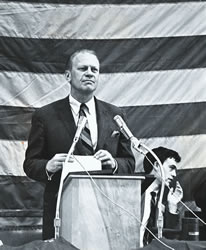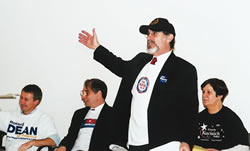Issue Contents :: Feature :: Oberlin's Conventional Wisdom :: Page [ 1 2 3 4 5 ]
1968: A Year of Upheaval
In 1968, Oberlin’s mock convention again went to the Republicans, who were seeking to recapture the White House from incumbent President Lyndon Johnson, who seemed a shoe-in for the Democratic nomination.
 |
Congressman Gerald Ford of Michigan chaired the 1968 convention. |
But the political world had turned topsy-turvy. The growing crisis in Vietnam prompted two U.S. Senators, Minnesota’s Eugene McCarthy and New York’s Robert Kennedy, to challenge Johnson for the Democratic nomination. On March 31, Johnson declared his intent not to re-run. By the time the 1968 mock convention arrived, America was divided over Vietnam and civil rights, and neither political party knew who its nominee would be.
With national chaos as a backdrop, Oberlin prepared for a two-day Republican showdown. But this presented a problem. By 1968, Republicans were a rare breed at the College; Newsweek magazine had canvassed American campuses and unearthed just 30 at Oberlin.
Despite some students’ outright disdain for the GOP, mock convention organizers knew the event would fizzle if their classmates didn’t throw themselves into it. Robert Krulwich ’69, heading Ronald Reagan’s mock convention team, had to cajole a friend to string along. “I said, ‘come on—let’s support Reagan. If we don’t, it won’t be real.’”
His reasoning worked. Soon students were scheming late into the night. A team backing New York Governor Nelson Rockefeller held 4 a.m. strategy sessions at a highway truck stop, where the chief attractions included strong coffee and six eggs for a dollar, recalls Richard Zitrin ’68, a leader in the Rockefeller camp.
The convention opened May 4 with Republican House Minority Leader Gerald Ford, a Michigan conservative who was unpopular with some students, flying in to chair the proceedings. Oberlin police whisked him past protesters and into Jones Field House where the convention was held. No one had a clue that Ford was just six years from assuming the presidency.
Mock Convention 2004
By Alex Parker ’04
Oberlin’s tradition of mock conventions died out in the 1960s, when a new generation of Oberlin students became too embroiled in the real world of politics to have time for a simulated one. The practice came to a halt after 1968, when the convention nominated Nelson Rockefeller and Ronald Reagan and was deemed “irrelevant” by the Oberlin Review.
Thirty-six years later, the Oberlin College Democrats uncovered the largely forgotten tradition. “None of us realized how big of a deal it used to be,” says co-organizer Abby Deats. “We had no idea what we were living up to. Obviously, we couldn’t, because times are different now.”
The 2004 Oberlin Mock Convention—a more scaled-back version of its predecessors—was equal parts serious discussion and tongue-in-cheek fun, as participants tried to capture the carnival atmosphere of conventions past. Informational leaflets, policy debates, and occasional spirited arguments were intermixed with the button-making machines, canny candidate impersonations, and “Candidate Boxing.”
“Kerry and Dean dukin’ it out!” yelled announcer Robin Walker ’04, as boxers representing the two presidential campaigns took swings at each other with giant foam gloves in an inflatable ring. “Bring it on, blogman!”
The candidates were represented by various Oberlin figures, many of whom relished their chance to play politics. Sociology Professor James L. Walsh, a public prosecutor and husband of an Ohio state legislator, staked out the event early to press the flesh and proclaim to passersby, “Hi, I’m Wesley Clark, and I’d appreciate your vote.”
Playing Howard Dean, Politics Professor Chris Howell worked in a paraphrase of the governor’s famous “Scream” speech into an answer. Professor Harlan Wilson also made sure to deliver such Senator John Edwards sound bites as “We’re gonna outsource the government!” with Edwards’ distinct Carolina drawl. Oberlin President Nancy Dye, playing Dennis Kucinich, imitated the Ohio representative’s “No Strings!” proclamation, which he himself had made at Oberlin a few weeks earlier.
In a chain of events reminiscent of the vote-wrangling of past conventions, Howard Dean won the nomination by a single state, beating John Kerry (aka History Professor Steven Volk) 26-25, after three roll call votes. Of course, by this time the real Howard Dean had already dropped out of the race, and John Kerry was largely considered to be the inevitable nominee. Regardless, the passion for Dean had not abated.
Though the event’s
organizers will likely be gone when the next election rolls
around, they are optimistic that Oberlin’s tradition
of mock conventions will be revived.
�We had a really great
turnout, considering the fact that it wasn’t built
up all semester,” says Deats. “People were
saying at the convention that they hoped it would happen
again.” |
|
Next Page >>
|





